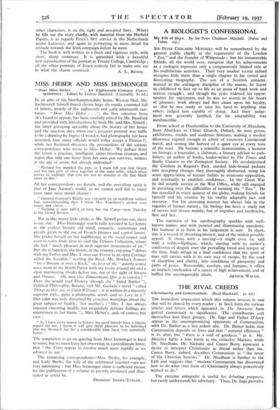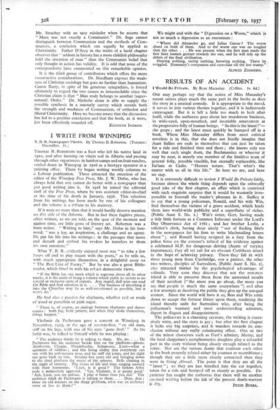Christianity and Communism. (Basil Blackwell. as. 6d.)
THE RIVAL CREEDS
THE immediate impression which this volume arouses is one that will be shared by every reader : in book form the various articles and letters which appeared in The Spectator have gained enormously in significance. The contributors sort themselves into three groups. Dr. Inge and Father D'Arcy appear as the uncompromising opponents of Communism, with Dr. Barker as a less ardent ally. Dr. Barker holds that Communism depends on force and that "material efficiency" is its altar, but "there is a soul of goodness" in it. Mr. Strachey fights a lone battle as the orthodox Marxist, while Dr. Needham, Dr. Niebuhr and Canon Barry represent a desire to interpret Christianity as friend rather than foe. Canon Barry, indeed, describes Communism as "the latest of the Christian heresies." Dr. Needham is further to the Left and suggests that "modern Communism has discovered how to do what (one form of) Christianity always powerlessly wished to do."
The extreme antagonist is useful for debating purposes, but rarely understands his adversary. -Thus, Dr. Inge provides Mr. Strachey with an easy rejoinder when he asserts that "Marx was not exactly a Communist." Dr. Inge cannot distinguish between Communism and the methods of Com- munists, a confusion which can equally be applied to Christianity. Father D'Arcy in the midst of a lucid chapter observes that" seldom in history has a more childish-philosophy held the attention of man" than the Communist belief that only thought in action has validity. It is odd that none of the correspondents have commented on this remarkable opinion.
It is the third group of contributors which offers the more constructive considerations. Dr. Needham exposes the weak- ness of Christian sociology but goes no further than humanism.' Canon Barry, in spite of his generous sympathies, is forced ultimately to regard the two causes as irreconcilable since the Christian claim is that "Man truly belongs to another (super- natural) Order." Dr. Niebuhr alone is able to supply the possible synthesis in a masterly survey which reveals both the strength and weakness of Communism, of orthodox and : liberal Christianity. Here we become aware that the discussion has led to a positive conclusion and that the book, as it were, has been effectively rounded off.
KENNETH INGRAM. ,















































 Previous page
Previous page